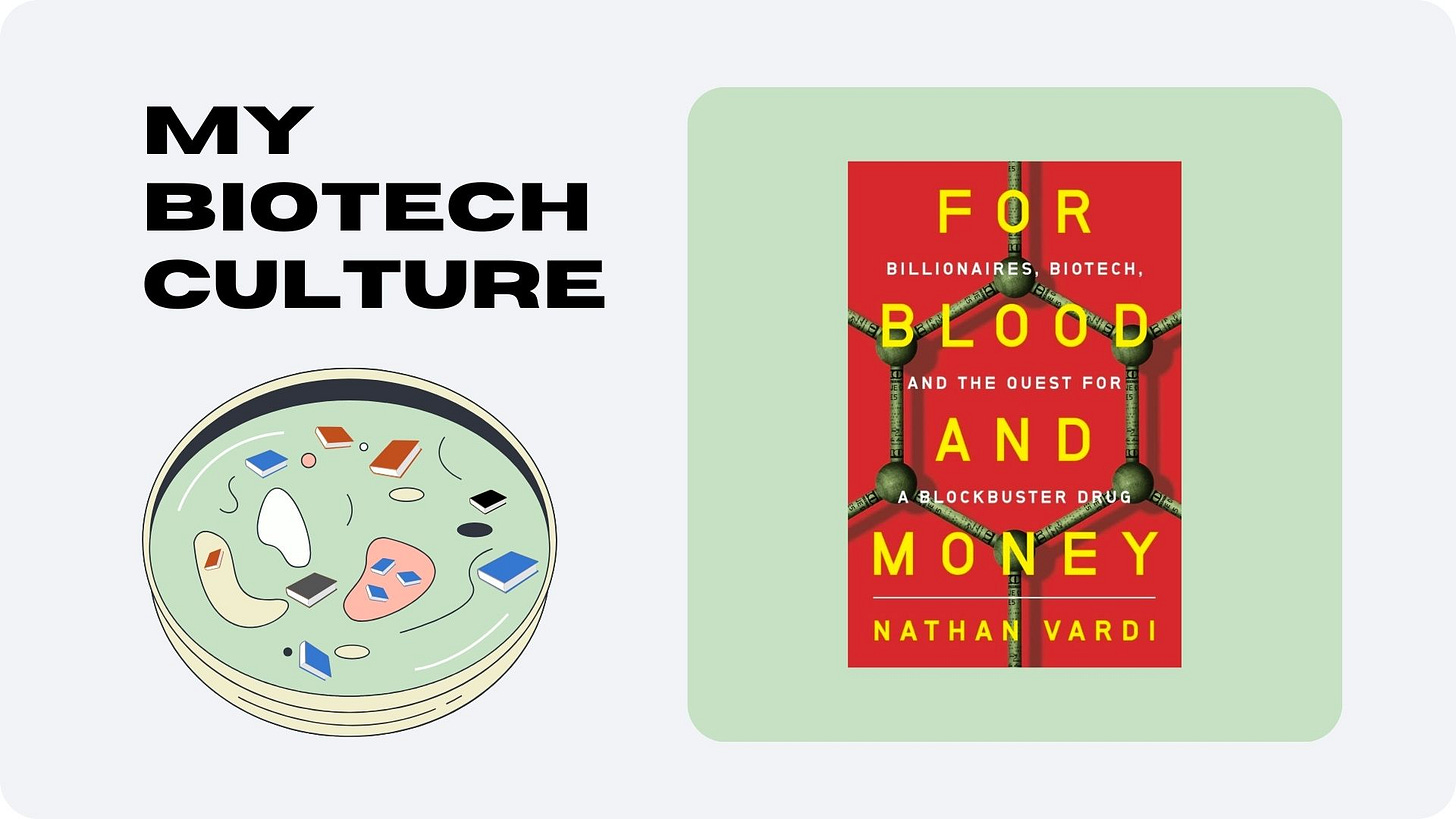My BioTech Culture #1 - For Blood and Money
Let's kick off this series with a dramatic true story of entrepreneurs and scientists who revolutionized blood cancer treatment.
After a decade of mastering math and AI, I ventured into BioTech.
My BioTech Culture is a collection of content I consume to help my techy brain cells grow outside their natural environment.
The story of bringing BTK inhibitors to market is the perfect example of reality being stranger than fiction. If someone had told me this was a fictional novel, I would have quickly dismissed it as an overly exaggerated melodrama, since on every turn of events my reaction was “Ho come on, no way 🙄”. But yes way.
[Don’t worry, no spoilers!]
Biotech is largely an industry that aims to help humans live longer healthier lives. It is only fitting, then, that this blog's opening post will concern one arduous journey to achieving this goal. One might think (or at least I did) that the biotech industry is a meritocracy of therapeutics, i.e., the best drug wins. In reality, as I realized from reading (listening to) this gripping book by journalist Nathan Vardi, bringing a new drug to market takes so much more than great science.
For Blood and Money depicts the decades-long process of creating a new class of Leukemia treatment - BTK inhibitors.
Since my goal in consuming all this content is to learn about the biotech industry, and since the goal of this blog is to process what I’m learning and hopefully pay it forward - let’s break down this complex sentence.
What is Leukemia?
Cancer is the phenomenon of cells growing and multiplying out of proportion. White blood cells are our immune system’s front-line soldiers. Leukemia is a cancer of the white blood cells - white blood cells grow and multiply out of proportion, thus not only losing their ability to protect our body from invaders, but also becoming the invaders themselves.
What is BTK?
A protein is a piece of genetic code that performs a certain function. In other words, our DNA is like the codebase of our body and a protein is like a tiny piece of the code that also runs its own program.
Kinase is a type of protein that accelerates chemical reactions by performing a specific kind of energy transfer.
Tyrosine is an amino acid. ACGT are the letters in our DNA code, and every piece of code can be translated into amino acids which are the letters in the protein code (think of 0 and 1 being the basic code for computers, and then a programming language has also letters and more digits and symbols, etc.). In some proteins that contain this “letter”, Tyrosine is the “on-off” switch for that protein code.
Tyrosine kinase, then, is a protein (a piece of code) that transfers energy to the “letter” Tyrosine in another protein, such that it de/activates the code in the target protein.
Bruton's Tyrosine Kinase (BTK), named after its discoverer, Ogden Bruton, is a type of Tyrosine kinase that plays a key role in the development of a specific kind of white blood cells. The BTK protein is generated from the BTK gene in our DNA (the “ACGT code” for a function is commonly named the same as the “amino-acid code” it generates).
The bottom line - BTK is a piece of genetic code crucial for maintaining our immune system.
What are BTK inhibitors?
When some genetic mutations occur in the BTK gene, the resulting BTK protein malfunctions in a manner that causes a specific type of white blood cells to lose their function, and grow and multiply out of proportion, i.e., cause Leukemia.
By inhibiting the activity of a malfunctioning BTK protein, one can hope to stop the spread of the cancer and even reverse its progress.
What does it mean “a new class of treatment”?
A class is a group of therapeutics that have a similar structure and function. The “race” of drug development is to be the first-in-class (invent/discover a new kind of structure, or be the first to treat a certain condition in a certain way), or to be best-in-class (invent/discover a variation of an existing drug that is better (what is better? that depends…)).
Many classes are defined by their target protein, and such is the case with the class of BTK inhibitors, i.e. the class of drugs targeting BTK to treat Leukemia.
Not all proteins are created equal, and to claim that targeting a certain protein (creating a new class) will lead to significant improvement in human health (that will translate to massive ROI…) - well that’s a bold statement. That’s why creating a new class is extremely difficult, and also extremely lucrative, when it works.
Now that we have all the pieces together I am ready to share why I loved reading (listening to) the story about the decades-long process of creating a new class of Leukemia treatment - BTK inhibitors:
First and foremost, this is just a great book, even if I didn’t care about Biotech. We are not in high school anymore and I don’t have to learn anything I don’t want to. That’s why I especially appreciate people creating captivating content that makes it so much easier to learn.
Biology is effectively an infinite field of study, and there is no way I can learn everything. That’s why I find it helpful to consume content that exposes me to a contained scope of knowledge - in the case of this book, it was kinase inhibitors for cancer treatment.
Biotech is a huge industry with countless written and unwritten rules. That’s why I try to get as many perspectives as possible about the business aspects of biotech. In the case of this book, I mainly learned about financing, clinical trials, and regulatory processes.
That’s it for today. Hope you enjoyed reading, and please let me know if you have further recommendations for me as well!




